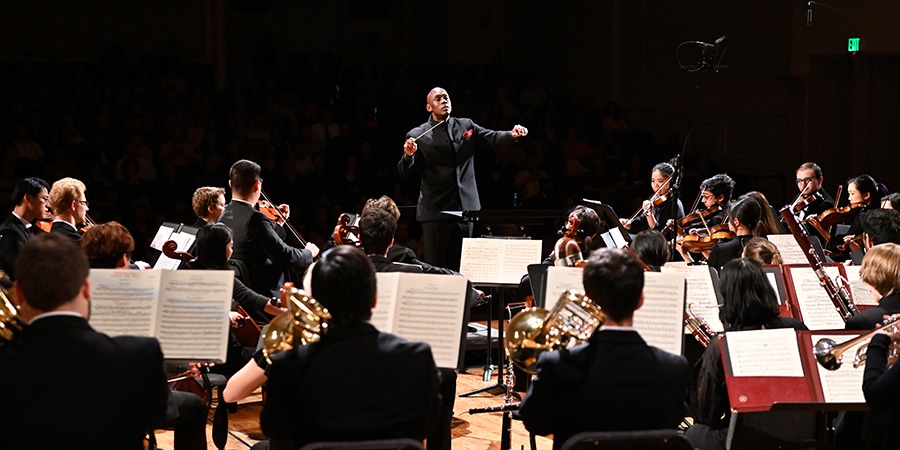Many people with natural musical abilities resist pursuing a music degree, thinking that they can get into the music business and be a success without any formal education. Having natural skills is great, but without a degree, you may not be able to have a business background and acumen to be a success.
Also, most people do not realize all the different careers those with a music degree can choose from once they graduate. Not all careers will be in performance but may be equally or even more rewarding.
Top 5 Music Degree Programs
| Rank | School | Location |
|---|---|---|
| 1 | Indiana University – Bloomington | Bloomington, Indiana |
| 2 | Arizona State University | Tempe/Phoenix/Glendale, Arizona |
| 3 | The University of Michigan at Ann Arbor | Ann Arbor, Michigan |
| 4 | Yale University | New Haven, Connecticut |
| 5 | The University of Miami | Coral Gables, Florida |
Two of the most common options that most music aficionados think of when considering their career, think of jobs performing or teaching others. Today, however, musicians often need to combine multiple jobs and different revenue streams just to support themselves and their families. Also, many that perform also teach on the side.
What Can You Do with a Music Degree?
There are numerous different jobs within the music industry that students may find appealing after completing a music degree. Many of these would not be available to those without a degree.
Some of the top jobs for consideration include:
- Accompanist in schools, camps, religious centers, dance rehearsals, and many other venues
- Music arranger
- Artistic management and director
- Audio production and editing
- Band director (K-12, college, military, sports)
- Community music school director
- Composer
- Concert Manager, promoter
- Conductor (orchestras: K-12, college, community, youth, domestic/international)
- Copyright consultant
- Music Therapy
Those that pursue a music degree will find that they have many transferable skills upon graduation. So, the door is wide open for those that complete a degree in music.
There are many schools to choose from when pursuing a music degree, so students do their “due diligence” when choosing the right school. We have rounded up some of the top schools so students can compare programs and determine the best choice based on their career aspirations.
The Best 7 Schools for Those Interested in a Degree in Music
Indiana University – Bloomington
At Indiana University at Bloomington’s Jacobs School of Music, students have great opportunities to learn from top faculty in top facilities that allow students to perform. The school encourages students to work together and collaborate, encouraging them to use their creativity to break through musical boundaries.
Students at Jacobs School of Music are offered the benefits of:
- Encouragement and opportunity to perform
- Attending an institution that has promoted the careers of numerous performers, and music educators
- Meeting students from all 50 states and 55 countries
- Receiving world-class educational practices
- Having the opportunity to perform with choral groups and many opportunities to enhance their musical education
The college has over 170 on staff and offers over 70 musical degrees and programs. Today they have over 1,500 music students and 1,100 performances by students. They offer Bachelor’s, MBE, BS, and Associates degree
School Overview
Arizona State University
The School of Music at Arizona State University recently merged with the dance and theatre schools and they are now the ASU School of Music, Dance and Theatre. Considered one of the top music schools in the country, they feature nationally and internationally, and guest artists as faculty. The key goal is to inspire and empower students to be their creative best.
The school offers a cutting-edge curriculum that inspires engagement and creativity. Students will find the opportunity to:
- Build on rich traditional foundations
- Learn advanced musical skills and practices
- Promote different forms of creative contributions to the field of music
- Engage in collaborative programs of study
- Opportunities to engage with other local arts organizations
First called the Territorial Normal School, in 1886 the school opened as the first higher education institution. It had 33 students in four classrooms. Today students pursue both graduate and undergraduate degrees in the schools Tempe, Phoenix, and Glendale campuses.
School Overview
The University of Michigan at Ann Arbor
The University of Michigan is located in Ann Arbor, Michigan. University’s School of Music, Theatre, and Dance is just one of many different programs dedicated to the arts. The University is considered to be selective with choosing applicants, but those that do get in, have many benefits as they earn their education. Some of the courses of study that students can apply for include:
- Composition
- Conducting
- Entrepreneurship and leadership
- Music education and theory
- Performing arts technology
- Voice
- Theater and drama
- Winds and percussion
The University of Michigan’s School of Music, Theater, and Dance offers over 40 undergraduate programs and 25 graduate programs. The school offers small classes with under 200 music students enrolled each year. The school offers undergraduate and graduate degrees as well as minors and certificates.
School Overview
Yale University
Yale University is a very selective private university located in New Haven, Connecticut, and is one in a group of Ivy League Schools. Unlike other schools, the Yale School of Music only accepts graduate students. Despite their innovative, separate degree program, it is still considered one of the top music schools in the U.S. Once accepted into Yale, you can apply for a performance certificate or a BA with an artist diploma. Yale University has a very selective acceptance policy and only accepts about 6% of the students that apply.
Upon completion of their educational program, students will possess a wide variety of benefits, including:
- The resources and faculty that Yale University offers
- Access to Yale’s libraries, art galleries, historical art galleries, drama/theatrical presentations, and concerts
- Access to Yale’s other professional schools
- Ability to broaden your musical and personal horizons, deepen thinking and enhance creativity
The Music major at Yale University is part of the school’s visual & performing arts program. The school offers several different degrees including Certificates in Music (2-4-year programs), 14 different bachelor’s degree programs, 117 Master’s Degree programs, and 14 different Ph.D. degrees.
School Overview
The University of Miami
The University of Miami’s Frost School of Music is a small school within the University of Miami. The school is a private research university located in Coral Gables, Florida. It features several different colleges and schools of learning including a school of medicine, law school, and the study of oceanography and atmospheric sciences. Students at Frost School of Music have access to many cutting-edge facilities that are located onsite. They include:
- Beautiful and inspirational concert and recital halls
- State-of-the-art recording studios and labs
- Technology centers
- Impressive music library
- Numerous rehearsal spaces
Originally named the Phillip and Patricia Frost School of Music was renamed in 2003, before that it was called the University of Miami School of Music. The school offers numerous graduate degrees including music composition, conducting, performance skills, music education, music engineering, music therapy, music business, and several more.
School Overview
Johns Hopkins University

The Johns Hopkins University is home to Peabody Institute, a highly respected conservatory located in Baltimore, Maryland. At Peabody, you will be welcomed into a community of artists, study with world-class faculty, and hone your musical gifts. Their Breakthrough Curriculum emphasizes diverse skills of the 21st Century Musician, which will position you to launch your career in today’s ever-changing artistic landscape. There are a variety of opportunities in the Hopkins network including the Double Degree Program, which allows qualified students to simultaneously earn a Bachelor of Music or Bachelor of Fine Arts from Peabody and a B.A. or B.S. from Johns Hopkins. As a student at Peabody, you will learn:
- Excellence in your craft
- Performance flexibility
- Leadership as a citizen artist
- Communication, marketing, and practical skills
The Peabody Institute was founded in 1857 and finally opened in 1866. It is the oldest conservatory of music in the U.S. The music school has around 280 undergraduate students and 310 graduate students.
School Overview
University of Rochester
Located in Rochester, New York, the Eastman School of Music is a highly selective private university accepting around a 30% acceptance rate. Students attending Eastman School of Music can get a dual degree, though they will have to apply to each school. Students at Eastman have the opportunity to work with guests, artists, faculty, and each other in masterclasses. These opportunities allow students to express themselves, experience growth within their chosen industry and learn from other students and peers.
Students will:
- Benefit from opera companies, conservatory, and college music departments
- Learn through a wide variety of school programs
- Have recording opportunities
- Learn musical instrument and technology industry
The school stresses the importance of performance-intensive programs. It offers a wide range of both undergraduate and graduate degree programs that are developed to combine performance, musical skills, and professionalism to prepare them for life outside the walls of the campus. The school offers performer’s certificates, World Music Certificates, Arts Leadership Certificates, and many others. New programs are always being developed to keep students up to date on the latest technologies.
School Overview
Methodology for Rating Schools Offering Music Degrees
We understand it can be overwhelming when students are comparing different schools to pursue their music degrees. Our goal is to take some of the efforts away from students and do the work for them. When looking at the schools that offer Music Degrees, we looked at a lot of different statistics. We reviewed each school’s music program, studied many factors like the history of the program, the graduation rates the ratio of faculty to the student, and the cost for the program. All of these factors are of key importance when looking for schools that offer graduate and undergraduate degrees in music.
We also consider the variety of programs that each school offers as music is such a diverse subject with so many different offerings, we considered the scope of the programs offered as well.
For more programs, check out our online music degrees page.
If there is a school omitted from this list or if any information is incorrect, please contact us so any omissions or corrections can be made.


